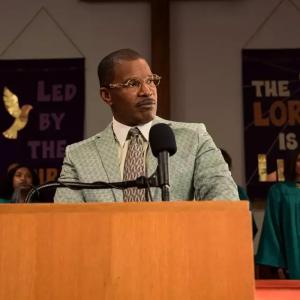
JR. Forasteros pastors the Haven Collective in Dallas, co-hosts the Fascinating Podcast, and wrote Empathy for the Devil. He's on the quest to smoke a perfect brisket. His wife, Amanda, skates for Assassination City Roller Derby as Mother Terrorista. They're always looking for a new adventure, and their board game collection has been described as 'excessive' and 'really fun'. JR. has bylines at Relevant, Think Christian, Reel World Theology and more.
Posts By This Author
‘Hell Is a Mirror’
R.F. Kuang’s Katabasis explores an academic underworld and the power of human connection.
IN HER NEWEST novel, Katabasis, R. F. Kuang straps the mythic baggage of Dante and Orpheus onto two graduate students, Alice Law and Peter Murdoch. After accidentally killing their tyrannical professor, Grimes, the two sneak into hell to resurrect him. What they find there is barely distinguishable from their graduate studies. Kuang’s underworld is no cartoon inferno; it is a chilling landscape of extreme isolation, where the circles of punishment are the final expressions of the sins that isolate us in life.
The world of Katabasis (meaning “journey to the underworld”) is nearly identical to our own, save that magic is real. It has been institutionalized and is studied at the world’s premier universities. Grimes rules the Magick school at Cambridge with an iron fist, his abusive behavior excused as a function of his genius (and the price graduate students must pay for success). Alice and Peter are Grimes’ current star students, but this makes them more subject to his tyranny, not less. Alice “was of course underpaid and overworked, but this condition was common among graduate students and no one cared much about it,” Kuang writes. Neither Alice nor Peter (“the nicest guy in the world … who always holds you firm at arm’s length”) can see their suffering for what it is: a deluded isolation so complete that even hell seems preferable.
In ‘Frankenstein,’ a Tech Bro Meets His Monster
The most terrifying thing about power isn’t the force it applies; it’s the moral vacuum it creates in the soul of the person wielding it.
I think of the times I’ve made choices that were professionally powerful but ethically hollow—the quick decision that saved time but neglected a vulnerable party, the project that elevated my status but buried someone else’s contribution. We’ve all been Victor Frankenstein, playing God with a Promethean flame, only to be horrified when the fire scorches someone else.
‘Fantastic Four,’ Gaza, and the Children We’re Willing to Sacrifice
The Fantastic Four: First Steps starts out with a trade proposal of the highest stakes. Galactus, the world-eating villain of Marvel’s latest reboot, will spare the Earth from his insatiable hunger in exchange for one child.
The child on the cosmic bargaining table is Franklin, son of Reed Richards, aka “Mister Fantastic” (a subdued Pedro Pascal) and Sue Storm, aka “The Invisible Woman” (Vanessa Kirby, who really gets to shine as the Fantastic Four’s leader).
ICE Quotes the Bible in a New Propaganda Video
On Monday, the Department of Homeland Security shared a propaganda video on the social media site X.
The one-minute video opens with footage of helicopters taking off, and a man with a thick Southern accent says, “Here’s a Bible verse I think about sometimes. Many times.” As people in military fatigues don masks and ready weapons inside the helicopter, the man quotes Isaiah 6:8: “I heard the voice of the Lord, saying: ‘Whom shall I send, and who will go for us?’”
In ‘Sinners,’ the Juke Joint Is More Sacred Than the Church
The Mississippi Delta. 1932. A young Black man (Miles Canton) drives up to a small church building. He climbs out of the car, clutching the neck of a broken guitar. He is covered in blood.
As he approaches the closed doors, a children's choir sings "This Little Light of Mine." The doors open and the young man staggers inside. The left side of his face bears deep claw marks. The pastor, unperturbed, opens his arms and demands the young man — Sammie — come forward. A sudden cut transforms the Black preacher into a white creature, its mouth open and dripping blood, its arms spread wide.
‘Nosferatu’ Is Lenten Cinema for Those Who Can Stomach It
In Nosferatu, writer-director Robert Eggers seeks to empower Ellen as a martyr: Yes, her death is a tragedy. But by giving her agency in a world that sought to deny her humanity, Ellen is a savior, one who has laid down her life for her loved ones and for the world. The Christian parallels are obvious.
Fixing What the Internet Broke
Jason Pargin’s ‘I’m Starting To Worry About This Black Box of Doom’ is a parable of the dangers of the information age.
MAYBE YOU FIRST saw it while sitting in the waiting room of the doctor’s office — a Fox News banner update across the bottom of the screen. Or perhaps you saw the hashtag on X or Threads. Maybe you’re following the story as internet sleuths exchange theories on Reddit. Here’s what you know: There’s an SUV making its way from California to Washington, D.C., driven by a man and a woman in their 20s. They’re transporting some sort of nuclear device, and they plan to blow up the president. And, for some reason, law enforcement isn’t taking this very seriously.
It’s the story of the moment. Even though nobody has any real facts. Everyone just knows we’re collectively watching a disaster unfold.
Such is the setup for Jason Pargin’s I’m Starting to Worry About this Black Box of Doom, a parable of the dangers of the information age. Pargin’s witty, incisive novel illustrates how social media has eroded our ability to trust each other.
5 Horror Movies to Inspire Social Justice
Horror fiction is one of the first spaces to grapple seriously with concerns of justice. (No, really!)
With that in mind, I present five movies you can watch during spooky season that will not only thrill and chill you, they’ll also spur you to think and act for justice.
‘The Wild Robot’ Finds Beloved Community in an Ecosystem of Predators
In this world where only the fittest survive, can a robot’s commitment to help without agenda possibly work?
Political Violence Isn’t Just Theologically Wrong; It Doesn’t Work
“It’s a shame he missed.”
That was the first thought I had when I saw that someone had attempted to assassinate former President Donald Trump. My second thought was, “You shouldn’t think that — you consider yourself a peacemaker and pacifist.” I wondered how my Christian commitments could erode so quickly.
Like Moses, Furiosa Is a Liberator Raised in the Heart of Empire
Fury Road drew on Exodus imagery in Furiosa’s flight from the Citadel, leading her people to a promised land. No surprise, then, that the earlier beats of Moses’ story have striking parallels to Furiosa’s backstory.
Wonder Woman Vs. ‘Biblical’ Womanhood
In comic-book writer Tom King’s run on Wonder Woman, Diana has been fighting a battle not just of fists but of ideologies.
‘Civil War’ Highlights the False God of Neutrality
Especially for those churches who imagine ourselves to be a mediating middle path in a country where every issue has become sharply partisan, Civil War illustrates that objectivity ends where the suffering of vulnerable people begins.
‘Immaculate’ Shows the Dark Side of the Virgin-Birth Story
The gospel writers were not fixated on Mary’s sexual history; it’s the institutional church that objectified her — casting her as a perpetual virgin, elevating her sexual experience (or lack thereof) to be the most important thing about her
A Pastor Chats With AI Jesus
I put the chatbot on the “Southern Baptist” setting and braced for the worst.
THE AD FOR Text With Jesus promised “A Divine Connection in Your Pocket.” Developed by Catloaf Software, the app is an artificial intelligence chatbot that takes on the persona of the Alpha and Omega. In the paid version of Text With Jesus, you can also chat with Mary, the 12 apostles, Moses, and dozens of other biblical characters, including Satan (if you dare to enable him in the settings menu). Cue eye roll.
In November 2022, ChatGPT went public. With Generative AI now at our fingertips, offering conversational responses to users’ prompts, the AI revolution was officially in full swing. Tech giants such as Google, Microsoft, and OpenAI raced to provide the most accurate, engaging chatbot. But no one has taken the messianic furor around generative AI quite as literally as Catloaf.
A few years before launching Text With Jesus, Catloaf president and CEO Stéphane Peter had created Texts From Jesus, an app that sends users a daily Bible verse. In an email interview with Sojourners, Peter explained that the innovation of ChatGPT offered “a compelling new element of interactivity.” Instead of a static quote from the New Testament the new app lets users have conversations with an AI Jesus.
Meeting God at Night
Asa Merritt's fictional podcast “Six Sermons” has themes that can feel as apocalyptic as an invasion of body-snatchers.
PASTOR ALEXIS (narrated by Stephanie Hsu) is a recent divinity school graduate who has been hand-selected by Pastor William Hoyt (voiced by Bill Irwin) to succeed him at Trinity Grace Church in Ohio. Alexis has been working alongside Will, learning the rhythms and rigors of pastoring a small-town church. She’s young, radical, and fearless. These qualities — the very reasons Will chose her — are exactly what make a significant and influential portion of the congregation certain she’s the wrong choice. Then Will dies by suicide. Alexis is thrust into the role of lead pastor far sooner than she expected, and in apocalyptic conditions. All this is merely the first episode of Six Sermons, a 12-episode fiction podcast written by Asa Merritt (a journalist and author of the 2015 play True Believer about the Arab Spring).
Six Sermons is the story of how Alexis navigates this intense crisis: How will the cause of Will’s death impact the congregation? What should the memorial service entail? How is Alexis caring for her own mental health in the wake of her friend and mentor’s death?
Alexis, in particular, experiences God’s absence acutely. Six Sermons powerfully illustrates the humanity of pastors; both Will and Alexis are raw, vulnerable, and flawed. Early in their mentoring relationship, Will tells Alexis, “You don’t really know God until you meet him at night.” This is a story of meeting God at night.
In ‘The Burial,’ Churches Both Welcome and Exploit
Gary’s goal in the trial was to bring the buried deeds of the Loewen Group into the light, to tell the story they hid behind contracts and laws and cultural biases and systemic injustice. In doing so, he aims to purchase some measure of justice. Is this what Willie Gary learned in Black church?
‘Jurassic Park’ Offers a Lesson for T. Rex-Sized Megachurches
Thirty years after the release of the Steven Spielberg film that brought T. Rex to the silver screen and turned velociraptor into a global superstar, I sat in the theater watching Jurassic Park again. But this time, it wasn’t the giant dinosaurs that captivated me. It was a small, intimate conversation between Hammond and Sattler.
Scary Accurate Monster Stories for Each Enneagram Type
The word “monster” originates with the Latin words for “omen” or “warning.” The best monster stories teach us about ourselves — about the evil that lurks in our own spirits. That’s something horror stories and the Enneagram have in common.
The True Story of a Migrant Farmworker Who Became an Astronaut
A Million Miles Away feels like a story too good to be true. But the new film is the true story of José Hernandéz (Michael Peña), a migrant farmworker who became a NASA astronaut.



















